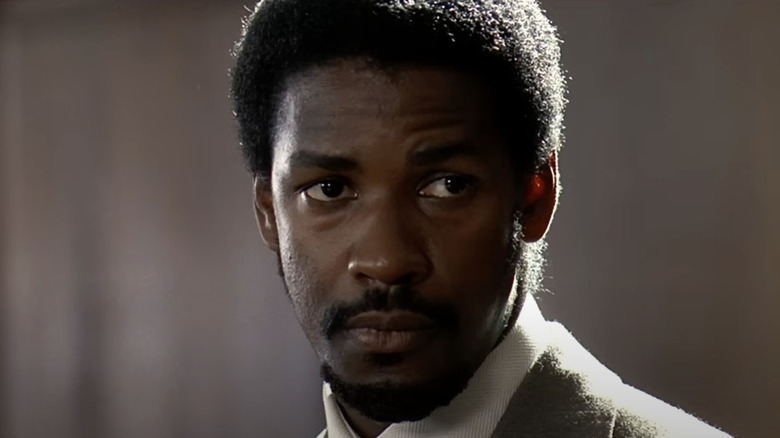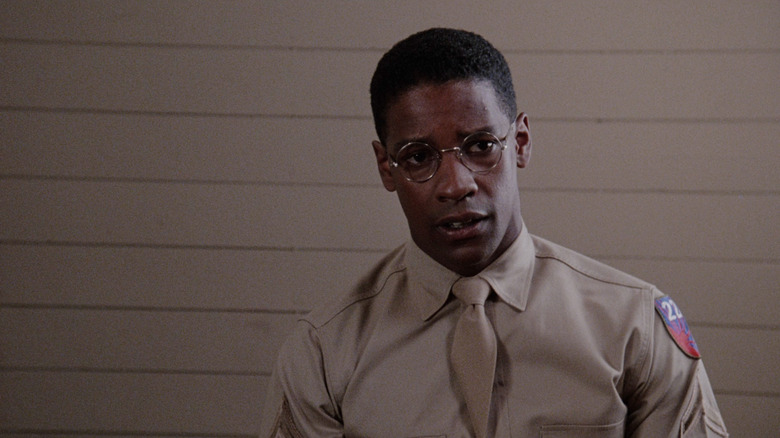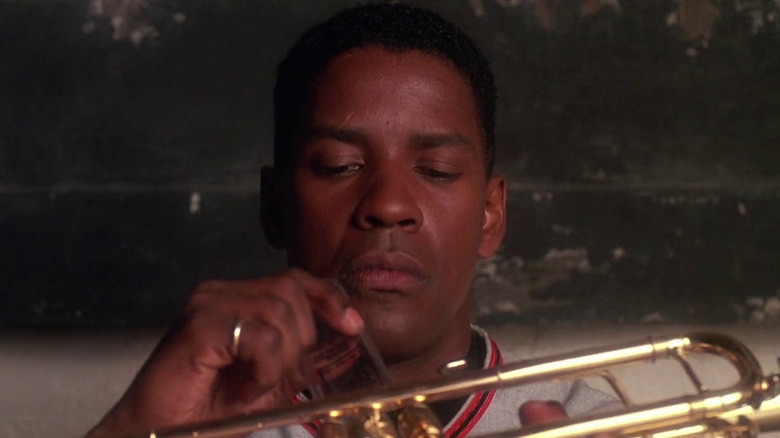Denzel Washington's First Starring Role Offer Was For A Stunningly Racist Movie
Denzel Washington first became interested in acting as a young man while he was taking a semester off from his tenure at Fordham University. During his time off, Washington took a gig at a YMCA in Connecticut, working as a summer camp's theater director, and it was there that his passion for acting finally ignited. He returned to school to study acting and landed some notable roles right away, appearing in plays by Eugene O'Neil and William Shakespeare. Washington's first screen acting credit came in 1977 in a TV movie called "Wilma: The Wilma Rudolph Story." He moved between TV, the stage, and films with aplomb, starring in a production of "Coriolanus" in 1979 and then the (decidedly not good) movie "Carbon Copy" in 1981. Some, however, might say his big break came in 1982 when he was cast as Dr. Philip Chandler in the hit medical drama "St. Elsewhere." He appeared in 118 episodes of that series through to 1988.
At that point, though, Washington had yet to play the lead character in a major motion picture, although he was keen to do so. He had already appeared in the 1984 Best Picture Oscar nominee "A Soldier's Story" and had a supporting role in Sidney Lumet's 1986 film "Power," so it was high time he got top billing in something. In 1987, Washington finally landed a plum role in the form of Steve Biko, the real-life South African anti-apartheid activist, in Richard Attenborough's "Cry Freedom," snagging the actor an Academy Award nomination.
It seems, though, that the offerings were slim for a Black actor in the mid-1980s, even for a proven talent like Washington. Before he took the "Cry Freedom" gig, Washington was offered the title role in a rather offensive satire that, by his eye (and, really, to anyone whose eyes are connected to their brain) was incredibly racist. The title of the film was (sigh) "The N**** They Couldn't Kill," and Washington talked about it in a video interview from 2010, hosted by the New York Times. By the title alone, you can tell this wasn't a worthwhile project.
Washington didn't hesitate to call out the film's blatant racism
It's hard to say what the point of the "satire" was, but Washington certainly didn't care. He just saw a film about a Black monster that played into horrendous racist tropes and even included lynching imagery. As he recalled:
"I got a part in a movie in 1986. It was called 'The N**** They Couldn't Kill.' He was supposed to be ... He r**ed a white woman. They tried to electrocute him, and it didn't work. And became sort of a cult hero. [...] And then they tried to hang him, and tried to do all this stuff.'"
Washington had trouble communicating to the film's casting directors just how offensive this script was. Rightfully enraged, he exploded at them, offering a sardonic comparison that he knew would grab everyone's attention. "I had a lot of 'Training Day' in me," he explained. When the casting directors tried to argue that an immortal Black man being hung on-screen was meant to be funny, Washington offered a bleak comparison, asking if it would be equally funny to witness Jewish people being executed en masse in a concentration camp. The actor, however, used far more explicit language:
"They said 'right,' and I said 'Right, that ain't funny.' So, to me, it wasn't funny putting a rope around my M.F.in' neck either. I made a point."
He most certainly did.
Having been in contact with Sidney Poitier, Washington felt he had to call the superstar to express his disgust in the process. He explained that he had been offered the lead role in a major film, but it was terrible. Naturally, Poitier was happy to provide some good advice on the matter.
Washington sought advice from Sidney Poitier
Poitier, of course, didn't want to be so bold as to dictate career decisions to Washington, but he did have some perspective that was helpful. Washington remembered their conversation as follows:
"I called Sidney, and I was sick. 'Cause he told me to call him. I called and I said, 'Man, they're offering me $600,000 to play 'The N**** They Couldn't Kill.' And he said, 'I'm not going to tell you what to do.' [...] He says, 'I can tell you this: the first two or three or four films you do in this business will dictate how you're perceived. So, you make a decision.' He didn't tell me what to do, and I appreciate that. And I turned it down. And six months later, I got 'Cry Freedom.' And got an Oscar nomination. So, you never know. My career could have gone an entirely different way."
Who can say where Washington's career might've gone if that offensive exploitation "comedy" movie had ever gotten made. As far as anyone knows, the entire project dried up sometime in the mid-1980s. Washington, meanwhile, starred in Edward Zwick's "Glory" only two years later, and this time, he won an Oscar for Best Supporting Actor. A year later, he starred in Spike Lee's "Mo' Better Blues," kicking off a long and lucrative partnership with the director. Lee would go on to call the shots on one of Washington's best performances in 1992 with "Malcolm X." The pair would continue to work on celebrated films after that, including their 2025 Akira Kurosawa remake "Highest 2 Lowest." Of course, by then, Washington had accrued a total of 10 Academy Award nominations and two wins.
Needless to say, Washington made the right decision.


